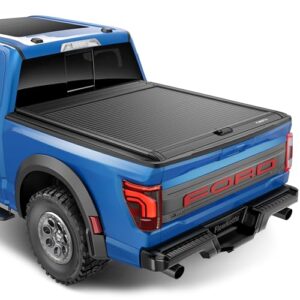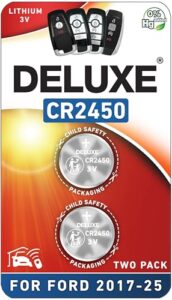As an Amazon Associate, I earn from qualifying purchases
Are you thinking about hitting the road with your camper but wonder if your Ford F150 can handle the load? Knowing whether your truck can pull a camper safely is key to a smooth and worry-free trip.
You don’t want to face surprises like poor handling or engine strain when you’re miles away from home. You’ll discover exactly what your Ford F150 is capable of and what to consider before hooking up your camper. Keep reading, because understanding this can save you time, money, and stress on your next adventure.
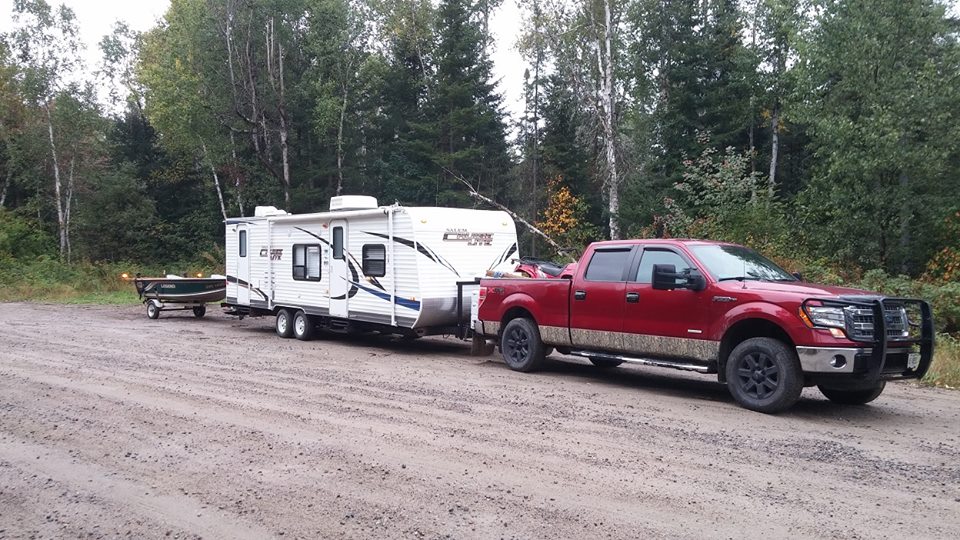
Credit: www.f150forum.com
Ford F150 Towing Capacity
The Ford F150 is well known for its strong towing power. Many drivers choose it to pull campers on trips. Understanding its towing capacity helps decide if it fits your needs.
The towing ability depends on the engine type, cab size, and other features. Different models have different limits. Knowing these limits keeps your trips safe and smooth.
Engine Options And Their Impact
The F150 offers several engines, each with unique towing strength. The base V6 engine has less towing power. The V8 and turbocharged engines tow heavier loads. Choose the engine that matches your camper’s weight.
Maximum Towing Limits
The highest towing limit for the F150 is about 14,000 pounds. This limit applies to the properly equipped model. Most campers weigh less than this, so the F150 can handle many campers easily.
Factors Affecting Towing Capacity
Towing capacity changes with the truck’s configuration. Payload, bed length, and axle ratio matter. Adding towing packages can increase the limit. Check your specific F150’s specs before towing.
Types Of Campers Compatible With F150
The Ford F150 is a popular truck for towing campers. It offers good power and towing capacity. Not all campers fit the F150 equally. Choosing the right type helps ensure safe and smooth trips.
This section explains the main types of campers that work well with the Ford F150. Each type suits different needs and towing limits.
Travel Trailers
Travel trailers are the most common campers for the F150. They come in many sizes and weights. Smaller trailers, usually under 7,000 pounds, match the F150’s towing capacity. They hook up easily and offer good living space. Perfect for weekend trips or longer vacations.
Pop-up Campers
Pop-up campers are lightweight and compact. They fold down for easy towing and storage. Their lower weight suits the F150 well. These campers expand once parked to offer more room. Great for those who want a simple camper with less weight.
Fifth-wheel Trailers
Fifth-wheel trailers attach over the truck bed. They usually offer more space and luxury. The F150 can tow smaller fifth-wheels if properly equipped. Check the truck’s payload and towing ratings carefully. These campers suit longer trips with more comfort.
Truck Campers
Truck campers fit directly into the bed of the F150. They do not require towing. This makes them easy to drive and park. They offer a compact living area for solo travelers or couples. Ideal for off-road adventures and flexible camping.
Key Factors Affecting Towing Performance
Towing a camper with a Ford F150 depends on several important factors. These factors affect how well the truck handles the weight and size of the camper. Knowing these helps you tow safely and efficiently.
Each factor plays a role in the truck’s power, control, and stability during towing. Understanding them ensures you choose the right setup for your camper needs.
Engine Power And Torque
The engine’s strength impacts towing capacity. More horsepower and torque mean better pulling power. The F150 offers different engines. Some provide higher torque suited for heavy campers.
Choose an engine that matches your camper’s weight for smooth towing.
Truck Suspension And Brake System
The suspension keeps the truck stable under load. Strong suspension prevents excessive bouncing or swaying. The brake system must handle extra weight safely. Upgraded brakes improve stopping power when towing.
Proper suspension and brakes reduce risks on the road.
Towing Package And Hitch Type
A towing package includes special features for hauling. It may have a stronger hitch, wiring, and cooling system. The hitch type affects how securely the camper attaches to the truck.
Choose a hitch designed for your camper’s weight to avoid accidents.
Camper Weight And Size
The camper’s total weight is critical. It includes cargo, water, and fuel. Larger campers need more towing power. Exceeding the truck’s capacity can damage it and cause unsafe driving.
Check the camper’s gross weight before towing.
Driving Conditions And Terrain
Road type and weather affect towing performance. Hills, rough roads, and wind add stress to the truck. Smooth, flat roads allow easier towing. Adjust driving speed and be cautious in tough conditions.
Good driving habits improve safety while towing.
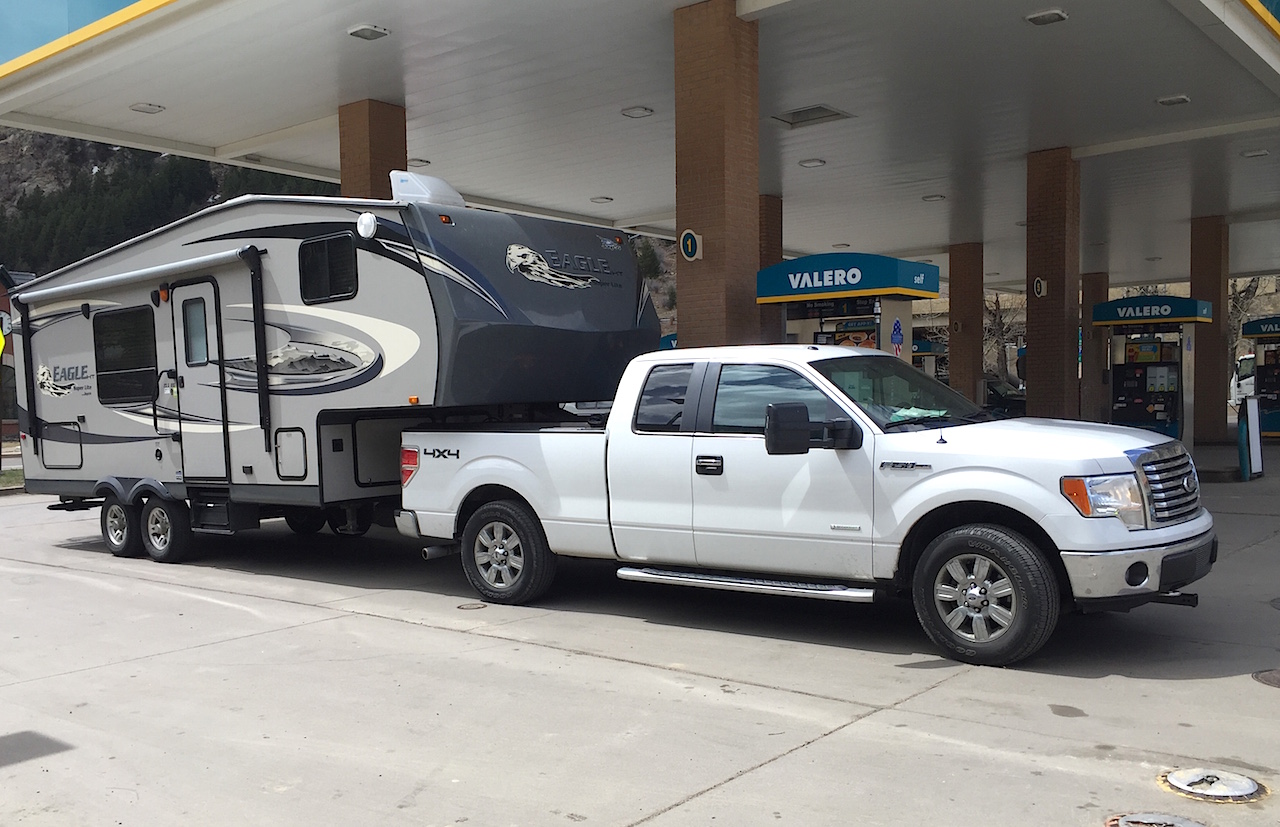
Credit: www.smart-stroy.com
Engine Options And Their Impact On Towing
The engine choice in a Ford F150 greatly affects its towing ability. Different engines provide different power and torque levels. These factors determine how well the truck pulls heavy loads like campers.
Understanding each engine option helps choose the right F150 for towing needs. Towing capacity varies widely depending on the engine type. Some engines offer more strength for larger campers.
3.3l V6 Engine
The 3.3L V6 engine is the base option for the F150. It delivers moderate power and torque. This engine suits light towing tasks and smaller campers. Its towing capacity is lower compared to larger engines. Good for occasional towing and everyday use.
2.7l Ecoboost V6 Engine
The 2.7L EcoBoost V6 is a turbocharged engine. It provides more power and torque than the 3.3L V6. This engine improves towing performance without sacrificing fuel efficiency. Suitable for medium-sized campers and trailers. Offers a balanced mix of power and economy.
5.0l V8 Engine
The 5.0L V8 engine is a popular choice for heavy towing. It delivers strong power and high torque output. This engine supports towing larger campers and heavier loads. Ideal for users who tow frequently and need extra strength. Provides consistent performance under load.
3.5l Ecoboost V6 Engine
The 3.5L EcoBoost V6 is the most powerful engine option for the F150. It uses twin turbochargers to boost power and torque. This engine maximizes towing capacity, handling the heaviest campers with ease. Best choice for serious towing needs and large trailers. Combines power with modern technology for efficiency.
Towing Packages And Upgrades
The Ford F150 is a popular truck for towing campers. Its ability to pull heavy loads depends on the right towing packages and upgrades. These options improve safety, control, and power. They make towing easier and more reliable.
Choosing the correct towing package is important for pulling a camper. Upgrades can increase the truck’s capacity and handling. This section explains the main towing packages and upgrades for the Ford F150.
Towing Package Options
The Ford F150 offers several towing packages. Each one adds features that help with heavy towing. Common packages include the Trailer Tow Package and the Max Trailer Tow Package. These packages add stronger hitches, cooling systems, and wiring for trailer lights and brakes.
Some packages also include a trailer brake controller. This device helps stop the trailer safely. It connects the truck’s brakes to the trailer’s brakes. This improves control during sudden stops.
Engine And Transmission Upgrades
The engine and transmission affect towing power. The F150 has different engines, such as V6 and V8 options. A bigger engine usually means more towing capacity. Upgrading to a more powerful engine helps pull heavier campers.
The transmission also plays a role. Some F150s come with special transmission coolers. These prevent overheating during long or tough towing jobs. Cooler transmissions last longer and work better under stress.
Suspension And Brake Improvements
Good suspension is important when towing a camper. Upgraded suspension parts help the truck handle extra weight. They keep the ride smooth and stable. This prevents swaying and makes driving safer.
Better brakes are needed for heavy towing. Some upgrades add larger brake pads and rotors. They help the truck stop more quickly with a heavy load. Brake upgrades reduce wear and improve safety on the road.
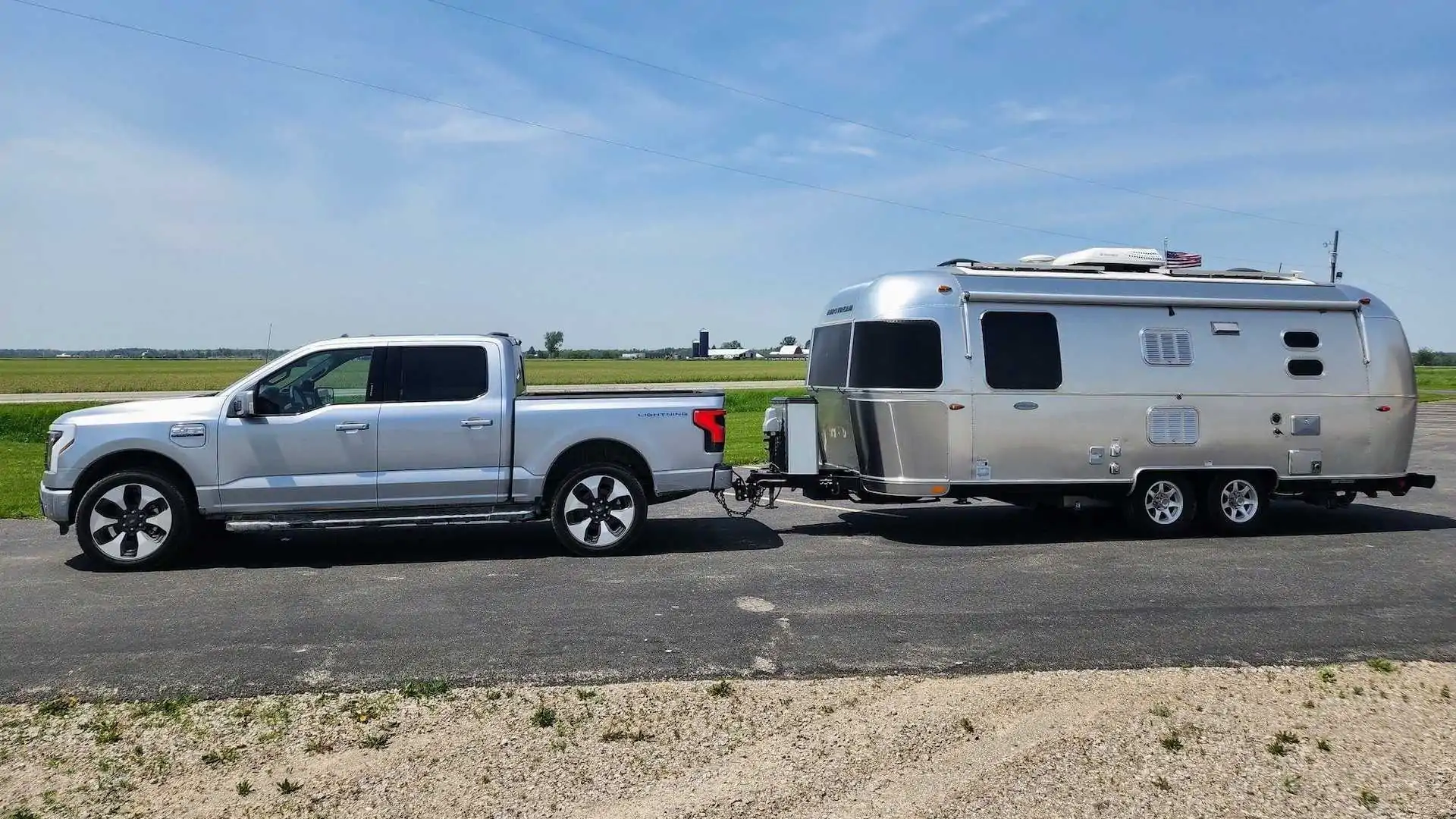
Credit: www.motor1.com
Safety Tips For Towing With A Ford F150
Towing a camper with a Ford F150 can be a rewarding experience. Safety must be the top priority. Knowing the right steps helps prevent accidents and damage. These tips will guide you through safe towing practices.
Check Your Truck’s Towing Capacity
Every Ford F150 has a specific towing limit. Do not exceed this limit. Overloading makes the vehicle unsafe and hard to control. Check the owner’s manual to find the exact towing capacity.
Use The Right Hitch And Equipment
Choose a hitch that matches the camper’s weight. Make sure all towing parts are in good condition. Use safety chains and secure connections. This keeps the camper stable on the road.
Distribute Weight Evenly
Balance the camper’s weight to avoid swaying. Place heavier items low and centered. Uneven weight makes steering difficult and increases risk of accidents.
Check Tire Pressure Regularly
Proper tire pressure improves control and fuel efficiency. Check both truck and camper tires before every trip. Underinflated tires can cause blowouts and loss of control.
Drive Slowly And Smoothly
Reduce your speed while towing. Avoid sudden stops and sharp turns. Smooth driving helps maintain control and reduces wear on your truck and camper.
Test Brakes And Lights
Ensure the camper’s brake system works well. Check all lights, including brake and turn signals. Proper signals keep you and others safe on the road.
Fuel Efficiency While Towing Campers
Towing a camper with a Ford F150 affects fuel efficiency. The truck uses more fuel to pull heavy loads. Understanding how towing changes fuel use helps plan trips better.
Fuel efficiency depends on camper size, truck model, and driving habits. The F150 is built to handle towing but expect lower miles per gallon (MPG).
How Towing Weight Affects Fuel Economy
Heavier campers make the engine work harder. This causes the truck to burn more fuel. Even a small increase in weight reduces MPG. Keeping the camper light helps save fuel.
Impact Of Driving Speed On Fuel Consumption
Driving faster uses more fuel when towing. High speeds increase wind resistance on the camper. Slower speeds improve fuel economy and control. Cruise control can help maintain steady speed.
Tips To Improve Fuel Efficiency While Towing
Check tire pressure often; low pressure wastes fuel. Remove extra weight from the truck and camper. Use the right gear for the road and load. Plan routes with fewer hills and stop signs.
Trailer Hitch Types For Ford F150
The Ford F150 is a strong truck. It can pull many things, including campers. To pull a camper safely, the right trailer hitch is needed. Trailer hitches connect the camper to the truck. There are different types of hitches. Each type works best for different needs and weights.
Choosing the right hitch helps protect the truck and camper. It also makes towing safer and easier. Below are common trailer hitch types for the Ford F150.
Receiver Hitch
The receiver hitch is the most popular type. It is easy to install on the Ford F150. This hitch has a square receiver tube. It fits different hitch accessories. Receiver hitches come in classes. Each class supports a different towing weight. The higher the class, the heavier the load it can tow.
Fifth Wheel Hitch
The fifth wheel hitch is for heavy campers. It mounts inside the truck bed. This hitch offers strong stability. It spreads the camper’s weight over the truck’s frame. Fifth wheel hitches are perfect for large campers. They make towing smoother and safer.
Gooseneck Hitch
The gooseneck hitch also mounts in the truck bed. It uses a ball and coupler system. This type works well for heavy trailers. Gooseneck hitches offer great maneuverability. They are common in commercial and farm towing. The Ford F150 can be fitted with a gooseneck hitch for tough jobs.
Common Challenges When Towing Campers
Towing a camper with a Ford F150 comes with a few challenges. Knowing these helps you prepare better. It makes your trip safer and more enjoyable.
Campers add weight and change how your truck drives. They affect braking, turning, and stability on the road. Understanding these issues is key for smooth towing.
Engine Strain And Fuel Consumption
Pulling a heavy camper puts more stress on the engine. The truck uses more fuel to move the extra weight. This means fewer miles per gallon and more stops at gas stations.
Handling And Stability Issues
Campers can make your truck harder to control. Sharp turns become tricky and the vehicle may sway. Wind and road bumps increase the risk of losing control.
Braking Distance Increases
More weight means longer stopping distances. Your truck needs more time to slow down or stop. This requires extra attention to traffic and road conditions.
Visibility And Blind Spots
Campers block rear views and create large blind spots. Changing lanes or reversing becomes difficult. Extra mirrors or cameras can help but require practice.
Legal And Safety Regulations
Different states have rules for towing campers. Weight limits, speed caps, and brake requirements vary. Knowing these laws avoids fines and ensures safety.
Maintenance Checklist For Towing
Towing a camper with a Ford F150 requires careful maintenance. Proper checks keep your truck safe and reliable. Neglecting these can cause breakdowns or accidents. Follow this simple checklist to prepare your F150 for towing.
Check The Tires
Inspect tire pressure before every trip. Tires need proper air to handle the extra weight. Look for signs of wear or damage. Replace tires if the tread is low or cracked. Good tires improve control and safety on the road.
Inspect The Brakes
Brakes work harder when towing a camper. Test brake pads and rotors for wear. Listen for unusual noises while braking. Replace worn parts to ensure quick stopping. Proper brakes prevent accidents and protect your truck.
Test The Suspension
Suspension supports the truck’s weight and trailer load. Check shocks and springs for damage or leaks. A strong suspension keeps the ride smooth and stable. Fix problems before towing to avoid poor handling.
Examine The Engine And Transmission
Engine power and transmission condition are vital for towing. Check oil and coolant levels regularly. Look for leaks or strange noises. Maintain transmission fluid to prevent overheating. Healthy engine and transmission improve towing performance.
Verify The Lighting And Electrical System
Trailer lights must sync with your truck’s signals. Test brake lights, turn signals, and running lights. Check wiring connections for corrosion or breaks. Proper lighting keeps you visible and safe on the road.
Secure The Hitch And Safety Chains
Inspect the hitch for cracks or rust. Tighten bolts and fasteners securely. Attach safety chains in a crisscross pattern. Chains catch the trailer if the hitch fails. Double-check all connections before driving.
Frequently Asked Questions
Can A Ford F150 Tow A Camper Trailer?
Yes, the Ford F150 can tow many camper trailers depending on the model and towing package.
What Is The Towing Capacity Of A Ford F150?
The towing capacity ranges from about 5,000 to over 13,000 pounds based on the engine and setup.
Which Ford F150 Model Is Best For Pulling A Camper?
Models with the 3. 5L EcoBoost V6 or higher towing packages work best for campers.
How Does Payload Affect Towing A Camper With F150?
Payload impacts how much weight the truck can carry inside, affecting towing safety and capacity.
Can A Base Ford F150 Tow A Small Camper?
Yes, base models can tow small campers but with lower weight limits and fewer features.
Do I Need Extra Equipment To Tow A Camper With F150?
A proper hitch, brake controller, and towing mirrors are usually needed for safe camper towing.
How Does Towing A Camper Affect Fuel Economy Of Ford F150?
Towing reduces fuel economy, often by 20-30%, due to extra weight and wind resistance.
Is The Ford F150 Better Than Other Trucks For Camper Towing?
The F150 is popular for towing due to its strong engines and good towing features.
What Safety Tips Should I Follow When Towing A Camper?
Check tire pressure, secure loads, use trailer brakes, and drive slower on curves and hills.
Can I Tow A Fifth-wheel Camper With A Ford F150?
Yes, with a proper fifth-wheel hitch, many F150 models can tow fifth-wheel campers safely.
Conclusion
The Ford F150 can pull many campers safely. Know your truck’s towing capacity first. Match the camper’s weight to that limit. Use proper hitch and towing equipment always. Check brakes, lights, and tires before travel. Drive carefully on hills and turns.
Regular maintenance keeps your truck ready. Enjoy your camping trips with peace of mind. Choosing the right Ford F150 model helps a lot. Safe towing means fun and worry-free adventures ahead.
As an Amazon Associate, I earn from qualifying purchases

